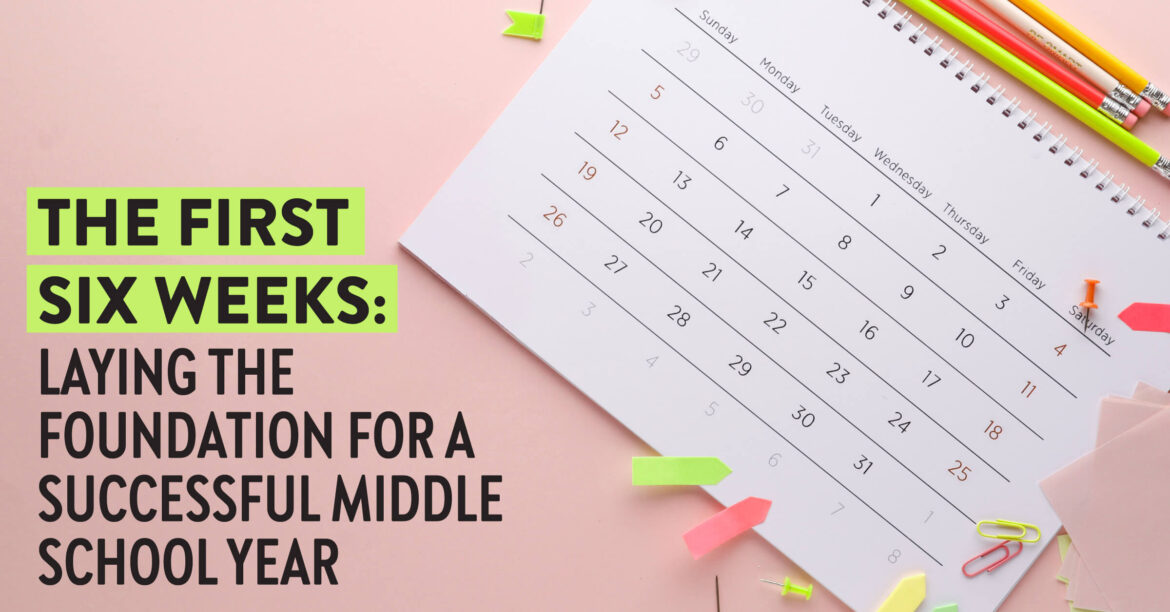By Farrah Cureton, Tiffany Wilson-Pugh, and Dr. Yuvraj Verma
The first six weeks of a new school year are essential. In middle school classrooms, those weeks are not just a warm-up. Rather, they are the foundation on which the entire school year is built. What happens during this crucial time period can make or break the year for both students and teachers alike.
Every grade level benefits from strong starts, but middle school presents unique challenges due to shifting identities, emotional rollercoasters, and growing independence. Therefore, a clear, consistent, and relationally rich approach to the first six weeks is paramount.
Build Relationships
In the words of former President Theodore Roosevelt, “People don’t care how much you know, until they know how much you care.” Middle school students won’t remember every lesson, but they will remember if you cared about them.
The early weeks of school must focus on building relationships and earning trust. Before diving deep into the curriculum, successful middle school teachers must humanize the classroom experience. This doesn’t require elaborate bonding activities or forced icebreakers. In fact, some of the best rapport is built through small moments, as long as they are consistent (i.e. greeting students at the door by name, asking about their weekends, noticing when someone seems off, etc.).
Consistency and presence matter more than flashiness. When students feel seen and safe, they behave better, take more risks personally and academically, and test boundaries less.
Rapport isn’t a soft skill. It is essential classroom management. Students are less likely to disrupt a class when they feel connected to the adult in charge and as though they are a part of a community. They’re also more likely to self-correct when they’ve internalized the mutual respect built through those early weeks.
Establish Structure
Middle school students crave structure even though they push against it. Rules are important, but pristine routines are where the real magic happens. The first six weeks must be devoted to making classroom procedures automatic (i.e. entering and exiting, transitioning, communicating about attendance, tidying up their desks, arranging their seats, etc.).
A common misconception is the assumption that students know “how to act.” On the contrary, it is important to very explicitly model every expectation, as well as rehearse it repeatedly until it becomes second nature. As simple as it may sound, “practice makes perfect.”
Being “extra” (as students say these days) at the start is advantageous in the long-run. For example, insisting that students keep their legs under their chairs or raise their hand before speaking, or redoing a task when one or two students mess up may appear extremely rigid, but doing so in middle school classrooms is vital.
If you expect students to only use the restroom one at a time, you must enforce this rule consistently, every single time. If participation is required, you must encourage it in a gentle but firm manner. The first time a rule is ignored and the student does not receive a consequence, you’ve unintentionally introduced an opportunity for future students to violate the directive.
Some teachers worry that this approach will make them seem too strict, but students respect consistency. Arbitrary enforcement can come across as bias, especially when students feel that rules seem to apply only sometimes or to certain kids.
Being “extra” about expectations in the first six weeks prevents chaos later. You can always loosen up as the year goes on, but it’s much harder to regain authority once it’s been lost. Adolescents thrive when they know the boundaries and can predict adult responses. In essence, clarity and consistency equate to caring and kindness.
Communicate with Families
In addition to a classroom where rapports are prevalent and where there is predictability and fairness of the teacher’s actions, communicating with families is quite beneficial. Unfortunately, educators often fall into the pattern of only contacting home when something goes wrong.
During the first six weeks, there’s an opportunity to create a very different narrative. Earlier in the school year, students are usually on their best behavior because they are eager to gain approval. Teachers should use this proverbial “honeymoon period” to reach out to families with some positive feedback.
This kind of upbeat initial contact sets the tone for a collaborative relationship with families, shows students that you notice and appreciate their efforts, and gives you positive credibility if there is a need to have a harder conversation. When you’ve already praised a student, a later call about misbehavior feels less like condemnation and more like concern.
Students often struggle with identity and self-worth in middle school, so knowing a teacher “saw” them enough to call home for something good is a confidence booster! Plus, families (especially those who haven’t always received positive school communication) deeply value receiving favorable feedback.
The first six weeks in a middle school classroom are not a warm-up. They are when relationships are built and routines become rituals. Being “extra” about expectations, positivity, and structure isn’t about control. Being “extra” is important because clarity and consistency equate to caring and kindness. A positive classroom culture and community will form, setting you and your students up for a strong and smooth school year.
Tiffany Wilson-Pugh is a veteran social studies teacher at Bessemer City Middle School in Alabama, with over 24 years of teaching experience. She holds a BA in History from the University of Alabama, a MAEd in Secondary Social Studies Education from the University of Alabama at Birmingham, and a MEd in School Counseling from the University of West Alabama.
Dr. Yuvraj Verma is a TEAMS math teacher at Bessemer City Middle School in Alabama and an Adjunct Professor of Graduate Education at William Howard Taft University in Colorado. He holds a BA in Sociology from Iona University, a MAT in Elementary and Special Education from the Relay Graduate School of Education, and a MBA in Healthcare Administration, EdS in Education Administration, and EdD in Technology and Leadership from William Howard Taft University.





